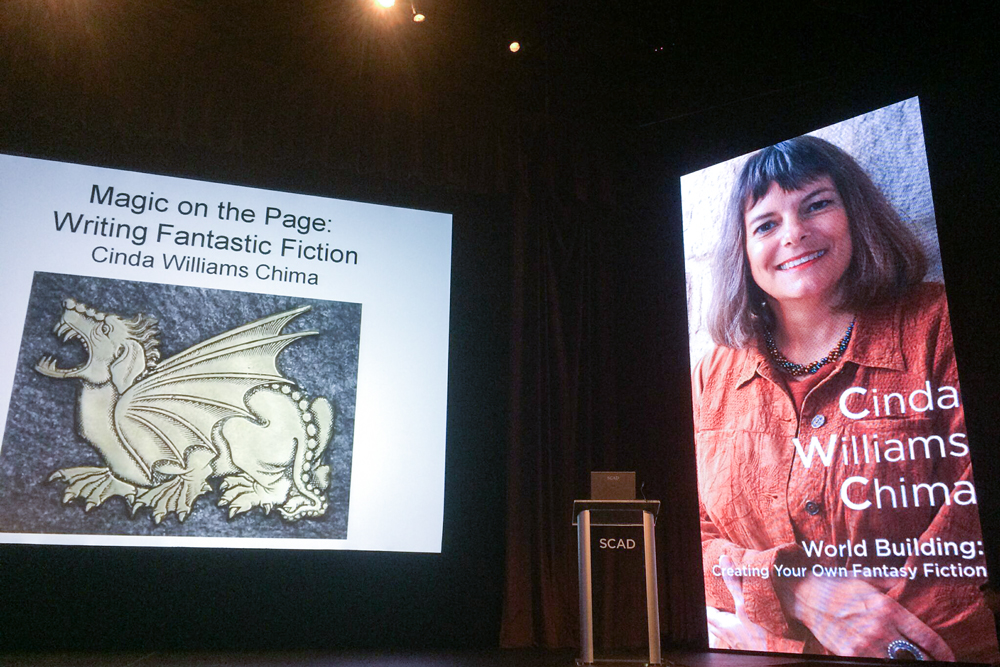Cinda Williams Chima: ‘Language is powerful’

Acclaimed YA and fantasy author Cinda Williams Chima spoke at SCADshow on Monday, May 4. Chima (whose last name is pronounced like China) gave a lecture entitled “Magic on the Page: Writing Fantastic Fiction,” an entertaining and informative rundown of how to craft a compelling fantasy story.
Though Chima is known primarily as a YA author, she quips that she writes “for teens of all ages,” and half-jokingly refers to her work as “wizards behaving badly.” Her fantasy novels include the “Heir Chronicles” series and the “Seven Realms” series, both of which have been New York Times bestsellers. Her upcoming “Shattered Realms” series, a “Seven Realms” spinoff to be published by HarperCollins, will begin in the spring of 2016 with its first book, “Flamecaster.”
The author kicked off her lecture by emphasizing that writing fantasy fiction is not that different from writing traditional fiction. “All of the elements of good fiction are there in fantasy, only with magic added,” she wryly noted. The elements of good fantasy fiction, which served as the four guideposts for Chima’s comprehensive presentation, included setting, characters, plot and magic.

Setting
Setting is a crucial element in fantasy fiction because a well-crafted world is what immerses readers. “You must put the reader in a new place,” Chima emphasized. When it comes to establishing setting in fantasy, there are more options, since you are not bound to reality. But as Chima pointed out, “All novelists engage in worldbuilding,” whether their worlds are down-to-earth or far from it.
Chima also stressed the importance of not beating readers over the head with information about the world you have built, explaining, “No reader wants to know everything you know.” She connected this concept to Ernest Hemingway’s iceberg theory, in which a writer’s vast knowledge of his or her subject is an iceberg of which readers see only the tip.
Chima’s advice for creating setting in fantasy fiction boiled down to a single phrase, which she once heard from a writing student: “You take real life and change it up.” The author cited a number of successful fantasy stories that have used this method, such as the “Divergent” series, which is set in a post-apocalyptic Chicago — author Veronica Roth took Chicago and changed it up.
Characters
Chima did not spend much time discussing characters, but she was emphatic in stating their importance. She explained that character drives the success or failure of fantasy fiction, and that no successful series is without a memorable, relatable cast of characters. Chima referred to J.K. Rowling’s “Harry Potter” series as an example of a fantasy series with exceptionally strong characters.
Plot
Chima’s discussion of character segued nicely into her breakdown of plot. She urged audience members to consider two questions when attempting to construct their own stories: what do your characters want, and what’s stopping them from getting it? “Story comes from the desires of characters, not the desires of the author,” she stated. A successful narrative grows organically from its characters, meaning that the author’s duty is to create strong characters and then get out of their way.
Magic
The lecture’s fourth and final point was magic, which must be handled correctly for a fantasy story to succeed, Chima explained. First, the author noted that magic in your story must operate by clear rules and limits — “That’s why you have to have kryptonite,” she said with a grin, referring to Superman’s only weakness. Without this magical limitation, the otherwise indestructible Superman would have no possible conflicts to overcome, and his story would fail.
Chima also warned against altering magical rules in order to get characters out of trouble. Your story must abide by the “magical system” you’ve built — Superman can’t become immune to kryptonite out of nowhere when faced with a crisis, for example — or readers will feel cheated. Whether magic in your story requires tools (such as Harry Potter’s wand), is only available to certain characters, or necessitates some kind of training process, you need to stick to your system.
Chima closed her lecture with a brief question-and-answer session in which she gave more general advice for aspiring authors. She pointed out that her website has a section dedicated to helping writers learn more about craft, publishing and so on. When asked about her drafting process, she stressed the importance of allowing yourself to write badly before revising — quoting author Danielle Steele, Chima remarked, “I can fix anything but a blank page.” And when discussing magical systems, specifically spoken-word spells, Chima delivered the line of the night: “Language is powerful.”
You can follow Chima on her blog, Facebook and Twitter.



















